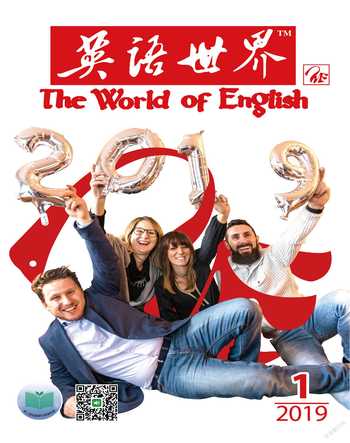翻译擂台(第29期)
林巍
【原文】
[1] 早在中国远古时代,戏曲的种子已经在歌舞中孕育了,进入阶级社会后,这种歌舞艺术的传统依然存留在广大的农村中,并不断革新发展以适应人民精神生活的需要。[2] 至汉代,民间出现了带有故事性的歌舞表演,如百戏中的《东海黄公》等。[3] 隋唐时期,带有喜剧性质的歌舞戏、参军戏相继问世,它们业已具备戏曲的雏形。[4] 在宋代,随着经济的发展,城市中出现了新兴的市民阶层,反映他们生活和观点的宋金杂剧院本应运而生,为其后元杂剧的形成奠定了基础。
—— 一丁
【点评】
中国的戏曲历史悠久,与希腊悲喜剧、印度梵剧并称为世界三大古老的戏剧文化,内涵丰富,形式多样,异彩纷呈。
[1]中,这里的“戏曲”显然是指“中国戏曲”,可译成Chinese opera,但更准确的应该是traditional Chinese opera,以表中国戏曲的特色。关于opera一词,下面还有所涉及、分析。
“早在中国远古时代”,参赛者有多种译法,如As early as in ancient China、Far in ancient China、Back in ancient China 等,似都不错,但因下面还要涉及“中国戏曲”,为避免重复,此处译为In ancient times即可。
“戏曲的种子已经在歌舞中孕育了”,有参赛者译为The seed of traditional Chinese opera was sowed in China’s song-and-dance dramas,sowed the seed固然可以,同时,“孕育”还有用be pregnant with、inoculation、gestation等,但比较而言,这里不妨用breed,该词义为to be the cause of something,如:Nothing breeds success like success.(一事成功万事亨通。)
“人民精神生活”,大都译成了people’s spiritual life,但是推敲起来,spiritual在西方很容易让人联想到宗教相关的,如a spiritual approach to life、spiritual fulfillment、spiritual values、spiritual healing等。其实,此处实质要表述的是people’s cultural life。类似的,“群众性精神文明创建活动”不是people’s creativity for spiritual and ideological activity,而宜为public activities to promote ethical and cultural progress等。
顺便而言,在汉英翻译中,内容与词语在语言层面有时似乎不“对称”,如通常说的某个人的“文化水平”并不是cultural level,而是educational background、schooling等,但在内涵上却是等值的。
故此,该句不妨译为:In ancient times, the seed of traditional Chinese opera was bred in songs and dances. After entering the class society, the artistic tradition of singing and dancing remained in vast rural areas, constantly innovating to meet the needs of people’s cultural life.
[2]中,“带有故事性的歌舞表演”,其中的“故事”参赛者多用了story、stories、storytelling等,似乎不错,但比较而言,narrative更為恰当, 该词的本义为“a message that tells the particulars of an act or occurrence or course of events; presented in writing or drama or cinema or as a radio or television program”,如:In this narrative performance, information might appear in any order.(在这个故事性表演中,信息可能会以任何次序出现。)
关于“民间”,很多人用了folk,固然该词可以用作名词,但更多情况下,该词用作形容词,如:A military band played Russian marches and folk tunes.(一支军乐队演奏了俄罗斯的进行曲与民乐。)此外,还有用among the people、nongovernmental、people-to-people等。其实,这里不妨选择populace,其义为people in general considered as a whole,如:The temple fair provided a unique public space for the populace to enjoy the leisure in rural society.(庙会为乡下民众提供了一个享受休闲的独特公共场所。)
故此,该句不妨译为:Up to the Han Dynasty (206BC-25AD), narrative folk songs and dances became popular among the populace, such as “Duke Huang of the East Sea” of Bai opera.
[3]中的“喜剧性质的歌舞戏”,许多人译成comedy songs and dances,此处应用形容词comedic,而“歌舞戏”为song-dance drama。
“雏形”,一般英文有miniature、mold、prototype、precursor等,参赛译文用得最多的是embryo,不过此处最好用其形容词形式,组成embryonic form。
整句可译为:During the Sui and Tang Dynasties (581-907), comedic song-dance drama and canjun opera, came into being one after another, shaping the embryonic form of traditional Chinese opera.
[4]中,“新兴的”(市民阶层),参赛者用得最多的是emerging、mergence、new、give birth to、fresh等,都是可以接受的。类似的,如:①运筹学是一门新兴的学科。(Operational Research is a newly emerging subject.)②他新興的事业生气勃勃,前途光明。(His fresh enterprise is full of life and has a bright future.)此外还有rising、jumped-up等。但是,考虑到当时社会的盛世状况,不妨选择burgeoning,其本义为begin to grow or develop rapidly。
同时,“市民阶层”,在这里多少有些前现代社会性质的概念,似可用burgher class、civilians,但前者主要指某些欧洲国家中产阶级的市民或镇民,而后者是现代社会的一个法律概念,故不妨用中性的urban inhabitants。
“元杂剧”,一般译成了Yuan-Dynasty Zaju、Drama of the Yuan Dynasty、Yuan-Dynasty Opera等。其实,严格讲,Opera不是中国的传统艺术,尽管已有译文如Peking opera(京剧)、Cantonese opera(粤剧)、Shaoxing/Yue opera(越剧)等,但其本义为“a drama set to music; consists of singing with orchestral accompaniment and an orchestral overture and interludes”(特别是笔者所加下画线部分,纯属西洋乐特色)。然而,为便于英语读者接受,不妨“中和”一下,译为Yuan zaju opera。同样,“宋金杂剧院本”(宋叫“杂剧”,金叫“院本”,二者同一)也可作类似处理。
故此,整句不妨译为:With the economic growth, in the Song Dynasty (960-1279), the burgeoning urban inhabitants emerged together with Song and Jin zaju opera to reflect their life and views, laying the foundation for Yuan zaju opera to take form.
显然,翻译中所追求的对等,不是词面意义上的,而是实际内涵中的。
【优胜者】
@飞吧 @Tracy ZHANG(张小琴)

